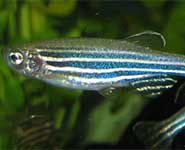The work, carried out in collaboration between the University of Bristol’s School of Veterinary Sciences and AstraZeneca Brixham Environmental Laboratory, investigated whether scientists are using the right anaesthetics and if current best practice for fish could be improved.
The research team’s behavioural study evaluated nine of the most commonly used anaesthetics and performed preference tests using adult mixed sex zebrafish (Danio rerio), the most commonly held laboratory fish, to record their responses. Video tracking software measured swimming behaviour related to dislike for each anaesthetic at 50 per cent of its standard recommended dose compared with clean water in a flow-through chemotaxic choice chamber.
The aim of the research was to find out if anaesthetic compounds cause changes in the swimming behaviour of the zebrafish and whether the potential stress induced in these animals is inhumane.
Zebrafish embryos are transparent and develop outside the body, allowing simple study of the developing embryo. Zebrafish research provides a unique visual approach to understanding the developmental defects in adult diseases and age-related abnormalities, such as cardiovascular diseases.
Dr Jo Murrell, Senior Lecturer in Veterinary Anaesthesia at the Vet School and co-author on the study with Gareth Readman, Bristol PhD student and fish biologist at AstraZeneca, said: “Zebrafish are the most commonly used fish in universities and research organisations. There is a need to use anaesthetics to help handle them, collect samples, or humanely euthanise them.
“With tens of millions of fish used in science around the world, it is very important that the anaesthetics used to do this are the most humane available and do not themselves cause a stress response. “
The team found that several commonly used anaesthetics were aversive, including two of the most commonly recommended and used: MS222 (ethyl 3-aminobenzoate methanesulphate) and benzocaine. For ethical best practice, it is recommended that compounds that are aversive, even at low concentration, should no longer be used routinely for anaesthesia or for the first step of humane euthanasia of adult zebrafish.
Two agents were found not to induce aversive behavioural responses: etomidate and 2,2,2 tribromoethanol.
For the millions of adult zebrafish used in laboratories and breeding worldwide, the research team found the anaesthetic etomidate appears best suited for future routine humane use.
There have been advancements in general veterinary anaesthesia for mammals, but fish have been left behind and the research team hope this work will begin to re-address that balance.
Paper: Do fish perceive anaesthetics as aversive? Gareth D. Readman, Stewart F. Owen, Joanna C. Murrell, Toby G. Knowles, PLOS ONE, September 2013, Volume 8, Issue 9.
